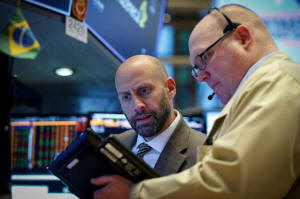Cyclical sector rally banks on global economic expansion
 Send a link to a friend
Send a link to a friend
 [October 14, 2017]
By Lewis Krauskopf [October 14, 2017]
By Lewis Krauskopf
NEW YORK (Reuters) - U.S. stock sectors
that are particularly dependent on economic growth recently grabbed hold
of the market’s rally and are poised to keep the reins should further
signs of global expansion emerge.
Such sectors, including energy, industrials and financials, beat the S&P
500’s 1.9 percent gain in September. Those sectors had previously lagged
behind the benchmark S&P <.SPX>, which has climbed 14 percent this year
while feasting on a steady diet of record highs. Instead, shares of
technology and healthcare companies, whose profits are more impervious
to economic down cycles, have led 2017’s rally.
The question for equity investors is now: Was September just a catch-up
period for the lagging, cyclical sectors, or can an economic lift
support a sustained run?
“If it’s just a mean-reversion trade, then it’s probably going to last
another few weeks and then we’re back to the old winners,” said Walter
Todd, chief investment officer at Greenwood Capital Associates in
Greenwood, South Carolina. “If it’s something more fundamental, it
should be longer lasting than that.”

A test comes next week, as third-quarter corporate earnings season kicks
into high gear. Reports from industrial conglomerates General Electric
<GE.N> and Honeywell International <HON.N>, railroads CSX Corp <CSX.O>
and Kansas City Southern <KSU.N> and steel company Nucor Corp <NUE.N>
stand to yield insight into the economy's health.
September's stock action, which also included outsized gains for
small-cap stocks, had echoes of the immediate aftermath of President
Donald Trump's election in November 2016.
The same areas showed strength on hopes that a Republican-led federal
government would push through an agenda, including tax cuts and
deregulation, that juices economic growth. Those trades faded as Trump
struggled to rack up any significant legislative wins.
Now, investors say, September's stock rally for those groups again
stemmed at least in part from policy hopes, as Trump revved up his
tax-reform push.
“In many ways, we began to replicate the market performance following
Trump’s election,” said Quincy Krosby, chief market strategist at
Prudential Financial in Newark, New Jersey.
But an improving economic picture in the United States and globally
lends confidence for the cyclical sector rally.
The Citi economic surprise index for the United States <.CESIUSD>, a
measure of economic data that can come in weaker or stronger than
forecast, is around a five-month high, with the barometer trending
higher since hitting multi-year lows this summer.
[to top of second column] |

Traders work on the floor of the New York Stock Exchange (NYSE) in
New York, U.S., October 4, 2017. REUTERS/Brendan McDermid

This week, the International Monetary Fund upgraded its global economic growth
forecast for 2017 by 0.1 percentage point to 3.6 percent, and to 3.7 percent for
2018, from its April and July outlook, driven by a pickup in trade, investment,
and consumer confidence.
The U.S. Commerce Department last month revised its estimate for second-quarter
gross domestic product growth to 3.1 percent, up from 3 percent.
“We've just had better data," said Jim Paulsen, chief investment strategist at
The Leuthold Group in Minneapolis, who also points to indicators such as firming
industrial commodity and oil prices and a rise in the Baltic Exchange's main sea
freight index <.BADI>.
“Those things are all kind of reflecting a realism of economic momentum, not
just a one-off, Trump pie-in-the-sky expectation about policy change,” Paulsen
said.
Bets seemed to build on the cyclical sectors in the first week of October, which
saw flows into the largest sector exchange-traded funds for financials <XLF.P>,
industrials <XLI.P> and energy <XLE.P>, and outflows for technology <XLK.P> and
healthcare <XLV.P>, according to Lipper data.
“There is some momentum developing in these underperforming sectors," said
Anthony Saglimbene, global market strategist at Ameriprise in Troy, Michigan.
Earnings results could sway that momentum. Technology, which has gained 29
percent this year, topping all sectors, is expected to post a 12.2 percent
increase in third-quarter profits, more than twice the expected rise for
cyclical groups such as industrials and materials.
Kate Warne, investment strategist at Edward Jones in St. Louis, said global
growth "hasn’t been strong enough for investors to feel comfortable that we will
continue to see the earnings delivered by those companies in the way that tech
and healthcare have consistently delivered stronger earnings.”

"For the cyclicals to continue to outperform, we have got to see signs that
economic growth globally is accelerating, even compared to what we have seen so
far this year," Warne said.
(Reporting by Lewis Krauskopf; Editing by Jennifer Ablan and James Dalgleish)
[© 2017 Thomson Reuters. All rights
reserved.] Copyright 2017 Reuters. All rights reserved. This material may not be published,
broadcast, rewritten or redistributed. |